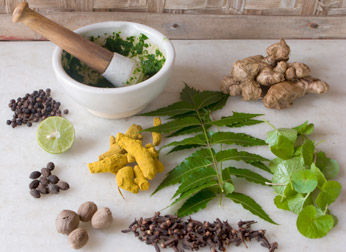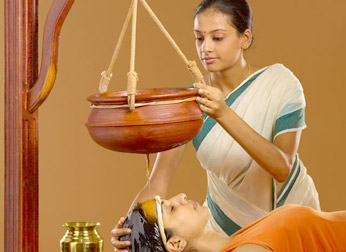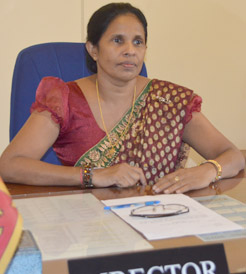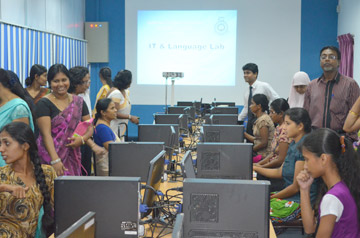|
To cater to contemporary society:
Indigenous medical system needs improvement
By Naalir Jamaldeen
"Plans are afoot increase the "Z" score to absorb students to the
Institute of Indigenous Medicine (IIM), to produce competent graduates
in Ayurveda and Unani Medicine. Through this mechanism, it is intended
to increase the standard of IIM. The Institute is now ready for Outcome
Base Education and Student Centered Learning. We will be shortly moving
for quality assurance and accreditation of our programs as well as the
Institute. We empower our students with scientific knowledge and
research methodology. Double Blind Randomized research are important in
the process of manufacturing effective and safe indigenous medicines
following a scientific process.
|

Ayurveda herbs |
Then the quality of Ayurvedic medicine can be ascertained, Acting
Director of IIM Dr. M.W.S.J. Kumari said in an interview with the Sunday
Observer.
The IIM, University of Colombo, Rajagiriya will sign a Memorandum of
Understanding with the Shanthi Lanka Ayurveda (Private) Limited in Japan
tomorrow (27) to conduct short term indigenous medical training courses
to Japanese students. The course duration will be one month and
theoretical and practical knowledge will be given to students . Fourteen
types of Courses such as Certificate Course in Ayurveda Level 1, Level
2, Level 3, Level 4, Ayurveda Beauty Care, Ayurveda Massage Therapy,
Yoga and Relaxation Therapy, Ayurveda Rituals, Baby Massage, Sri Lankan
Medical Plants, Mother and Child Care (Holistic Approach, Elders' Care,
Aromatherapy and Longevity and Anti-aging will be held.
Vice-Chancellor of the University of Colombo, Dr. W. Kumara
Hirimburegama and proprietor of the Shanthi Lanka Ayurveda (Pvt.) Ltd.
Japan Mr. Zuiko Tokunaga will sign the MOU. Managing Director Ms. Shoko
UMEHARA will be also be present, Dr. Kumari said.
"Indigenous medical system of this country has not fully been
recognised yet eventhough it caters tremendously to keep up the health
indicators of the country. People were not aware the significance of
this system earlier but now the trend is changing. The indigenous
medicine system has close links with our heritage.
 |
|
Oil therapy. |
Now, people are aware of the importance of the Ayurvedic Medical
System for the prevention of a large number of diseases and for health
promotion. It is also the answer for rapidly evolving non-communicable
and chronic diseases. Now Sri Lanka is in urgent need and is searching
remedies to overcome diseases like AIDS, Dengue, Cancer, Diabetes,
Hyperlipidemia, Heart Disease and Chronic Renal Diseases.
The Bandaranaike Memorial Ayurveda Research Institute(BMARI) has
launched advance research projects where IIM Consultants are greatly
involved as resource persons with the invitation of the current Director
of BMARI, Professor K.K.D.S. Ranaweera.
Our ancient knowledge was stored in Ola-leaves and hand written
manuscripts. At the time when Sri Lanka was dominated by the
colonialists, most invaluable heritages belonging to this country were
destroyed", Dr. Kumari said.
In countries such as India and China there is opportunity to study
their indigenous medicine system just like in other health streams. The
traditional medicine system is also known to Allopathic medical students
as it is their native medicine.
In Sri Lanka it is different. These as two different entities. Now
this trend is gradually changing.
 |
|
Director Dr. M.W.S.J.
Kumari |
Allopathic doctors too have started to pay attention towards this
system and there is an interconnection between these two sectors to some
extent.
The relationship between all medical systems is needed to overcome
the paradigm shift of illnesses in the Sri Lankan context and there
should be mutual esteem for the other system.
"When the people are specialized in their own medical system, they
can practise it easily and develop. Western doctors in certain countries
also know Ayurveda. But when compared to Allopathic medicine, the
indigenous medical system has not been given due recognition. Indigenous
medicine is practised in our country for more than 5,000 years. The Sane
Pulasti, a great physician of Sri Lanka has participated at the first
world Congress of Health held at the foot of the Himalayas to find a
solution for emerging diseases and propagate Ayurveda", Dr. Kumari said.
"The Indigenous medical system should be improved to cater to the
needs of contemporary society or according to the changes take place in
the medical world", she said.
"We don't know the value of our own medicine. In certain phases we
are degrading valuable things. This attitude should change. We can add
some more value to our indigenous medical system in future", the
Director said.
"The indigenous medical system should be expanded even beyond our
territory. We have taken steps to promote the indigenous medicine system
in foreign countries", she said.
"We have set up two Ayurvedic Health Promoting Centres in Melbourne
and Canberra in Australia in 2009 under public-private collaboration
with the help of the Ministry of Indigenous Medicine.
We should encourage monitoring such programs for sustainability. We
can do a lot for the promotion of Health with the guidelines of
Ayurvedic ethics and code of conduct. There is a huge demand for
purification processes (Purva Karma and Panchakarma),
Ayurveda Massage Therapy, Yoga and meditation and rejuvenation
therapy in European countries" Dr. Kumari said.
In Ayurveda there are health promotive measures such as how to
produce a healthy child, the daily routine and how to adopt for seasonal
changes. There are many ways to maintain the health condition of a
person.
When one is infected with disease he or she will be provided
treatment. Prevention is primary and that helps to promote health, she
said.
"In our Health promotion Centres in Australia Yoga, beauty therapy,
oiltherapy, rejuvenation therapy and Ayurveda massage therapies are
done.
Herbal tea is also given in those centres considering their body
constitution.", she said.
"During the colonial era we lost our invaluable traditional medicina
books. Earlier, indigenous medicine was practised by bhikkus and
practised in temples. There was a close link between indigenous medicine
and Buddhism. the Anuradhapura era was famous for traditional medicine
and was destroyed by the imperialists.
Books on medicine belonging to our forefathers should be protected
for our next generation. The hand-written books are the experience of
our indigenous medical practitioners. Using these books the new
generation can learn a lot about traditional medicine.
In the ancient history of this country, kings had also been
indigenous medical practitioners. Kings Maha Parakramabahu and Ravana
were famous physicians, There is a saying "Rajakama nethnam Vedakama"- If you don't become a king, you become a doctor,
this quotation shows the nobility of the Indigenous Medical Profession."
Dr. Kumari said.
A small description is included In Social Science and Health to
educate students abut Indigenous Medicine, but it is inadequate. Many
schools maintain herbal gardens even in the Colombo district", she said.
 |
|
Information Technology
Division. |
"Students also do small projects about Ayurveda. The IIM has
introduced many programs to schoolchildren to create awareness in
indigenous medicine and its importance. Already, the IIM has organised
four exhibitions this year including Deyata Kirula, Kuliyapitiya and
Expo International Exhibition held in Kandy.
Rare medicinal plants like Bin Kohomba and other valuable medicines
like kotalahimbutu, Ratnitul and Madara were exhibited. Our aim is, to
educate the public and school children about their own heritage, value
and protect it.
We also plan to set up a stall at the coming Deyata Kirula
Exhibition. The lecturers and students are also being trained to educate
the target groups", Dr. Kumari said.
"We held an exhibition at Alawwa, Rahula Vidyalaya from October 3 to
7 and the next exhibition was held at Prince of Wales Maha Vidyalaya,
Moratuwa from October 16 to 19. The school children were also made clear
of the missions and visions of IIM and the method of getting admission
for this sector", she said.
IIM has set up a medicinal plant house in the Institute premises, in
the plant house rarely found varieties of medicinal plants are
preserved. The students are also taught how to maintain a plant house
and what kind of plants can be preserved. A Tissue culture laboratory is
also available at the IIM, the Director said.
The 2nd International Conference on Ayurveda, Unani, Siddha and
Traditional Medicine will be held from December 16 to 19 this year under
the theme "Ayurveda the Medicine of today". This conference is organized
with the close supervision and the guidance of the Vice Chancellor,
University of Colombo, Dr. Kumara Hirimburegama and Chairperson of the
University Grant Commission, Senior Professor Kshanika Hirimburegama.
In line with the Conference an Ayurveda Expo will also be held.
Inauguration ceremony will be held at Waters Edge, Battaramulla on 16
December and scientific sessions will be held at the IIM Rajagiriya on
December 17 and 18, We welcome all the well-wisher from different
disciplines. She said.
"An Ayurvedic Expo will be held in line with the exhibition. Special
stalls will be set up for Sri Lankans and foreigners. Some Special
stalls will be set up to make the students aware of indigenous medicine,
medicinal plants, treatment systems and the human body. Students and
teachers are invited to participate in the exhibition which is to be
held in line with the second international conference at IIM premises,
Rajagiriya. We want to make the students and public aware of traditional
medicine of this country", Dr. Kumari said.
"Ayurveda Expo will provide a platform to exchange knowledge between
the countries which participate in the conference. I anticipate that
representatives from European countries including Britain will
participate in the conference. A business Forum will also be held in
line with the conference", she said.
New Indigenous Medicines in various formulations will also be
exhibited.
The public as well as professionals will get advantage to acquire the
knowledge of new arrivals, she said. "We have targeted to launch 160
research papers during the conference. Already 80 research papers have
been received. We need to highlight this is the medicine the people
today need", she said.
"M.D. Ayurveda and different Postgraduate students can also
participate. Those who do researches on traditional medicines will also
be given opportunity to take part in the conference and to submit their
research papers", she said.
"Government Jobs are the main problem faced by the ind genous medical
graduates. We can't always depend on the Government for jobs. We have a
Career Guide Unit in the IIM. We want to reform it. The Management Board
which gathered recently decided to set up a committee to assist the
students.
We will empower the students with clinical and drug manufacturing
knowledge. We also want to enhance trade skills of students."she said.
Syllabus of IIM has been changed to produce indigenous medical
practitioners suitable to the contemporary society. Certain special
plans will be implemented in future to improve the indigenous medical
sector of this country, Dr. Kumari said.
Besides, Dr. Kumari said that there are so many drug manufacturing
companies in Sri Lanka. "Yoga Sangraha Kamituwa" in the Ayurvedic
Department regulates the manufacturing activities of indigenous
medicines in Sri Lanka.
The drug manufacturers should get the permission from the committee.
While manufacturing drugs or medicines the quality should be maintained.
"Double Blind researches are important in the process of
manufacturing indigenous medicines, but still we are away from it, there
are a few such research projects. If Double Blind researches are done to
ascertain that standard medicines are produced in the country. We can
get the patrons while exporting quality products. High quality should be
maintained in the production process of traditional medicines, she said.
Dr. Kumari expressed confidence that indigenous medical graduates
more suitable to the contemporary society with new revised Curriculum
can be produced by 2017. English and Information Technology are taught
to students and they have been made compulsory and foundation subjects.
Soft skills are also taught to students.
"Current employment ratio of indigenous medical sector is nearly 30
percent in government sector according to a survey of Higher Education
Ministry by the date of convocation.
Jobs for Allopathic graduates and Engineers are assured. We should
take necessary steps to recognize potential area s of Job market for
Indigenous Medical Graduates, strengthening them with the required
skills to fit for the local and global demand ", she said.
"The IIM has implemented a project titled 'Higher Education for 21st
Century' (HETC).
The Government has allocated Rs. 6 million to empower students with
IT and English. If we can produce graduates with professional
qualifications, employment for indigenous medical graduates would not be
a major issue", she said. |

